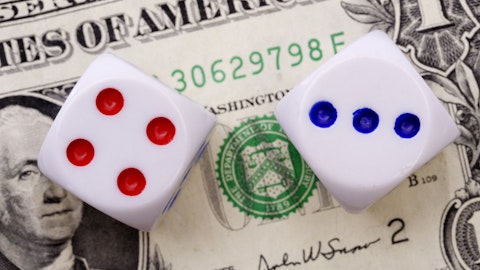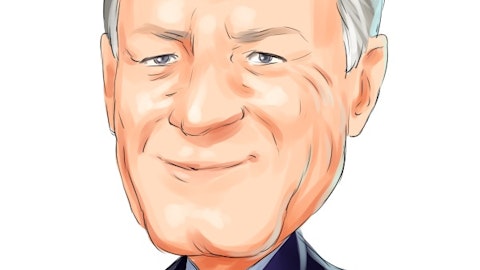On Wednesday Family Dollar Stores, Inc. (NYSE:FDO) reported its financial results for its fiscal third quarter of 2015, ending on May 30. Family Dollar Stores, Inc. (NYSE:FDO) posted third quarter profits of $79.9 million. On a per share basis the company reported diluted profits of $0.70, lower than the Zacks Average estimate of $0.82. The retailer posted revenue of $2.73 billion for the quarter, beating Zacks average estimate of $2.72 billion. During the same period in 2014, Family Dollar Stores, Inc. (NYSE:FDO) posted income of $0.71 per share or $81.1 million, with total revenue of $2.66 billion. Comparable store sales were up by 0.7% in the quarter. The company’s acquisition by and merger with Dollar Tree, Inc. (NASDAQ:DLTR), which has been on Family Dollar’s plate for almost a year, is expected to close later this month. The merger between the two discount retailers is awaiting final approval from the Federal Trade Commission (FTC). The company did not provide earnings guidance for FY2015, due to the pending merger proposal. Family Dollar Stores, Inc. (NYSE:FDO) stock has gained more than 18% in the last 12 months, but is trading flat in 2014 as investors wait for the proposed merger to be completed.

There was a significant reduction in hedge fund positions in the stock during the first quarter. There were 44 hedge funds with a total investment of $2.84 billion at the end of March, well down from the 60 hedge funds with a total investment of $3.86 billion in the stock at the end of 2014. Aggregate capital invested by hedge funds decreased by 26%, whereas the stock was flat during the period, showing that there was a migration of capital from the stock. This indicates that hedge funds lost their appetite for the stock at the start of the year as it continued to mostly sit in a holding pattern as it waited for its takeover to be completed. In Dollar Tree, Inc. (NASDAQ:DLTR), hedge fund ownership remained the same, at 63 funds, while total holdings increased greatly, to $3.77 billion from $2.91 billion.
Most investors don’t understand hedge funds and indicators that are based on hedge fund and insider activity. They ignore hedge funds because of their recent poor performance in the long-running bull market. Our research indicates that hedge funds underperformed because they aren’t 100% long. Hedge fund fees are also very large compared to the returns generated and they reduce the net returns enjoyed (or not) by investors. We uncovered through extensive research that hedge funds’ long positions in small-cap stocks actually greatly outperformed the market from 1999 to 2012, and built a system around this. The 15 most popular small-cap stocks among funds beat the S&P 500 Index by more than 80 percentage points since the end of August 2012 when this system went live, returning a cumulative 135% vs. less than 50% for the S&P 500 Index (read the details).
Likewise, other research (not our own) has shown insider purchases are also effective piggybacking methods for investors that lead to greater returns. That’s why we believe investors should pay attention to what hedge funds and insiders are buying and keep them apprised of this information. There were no insider purchases of the stock this year, but there were quite a few insider sales of shares during the first three months of 2015. CEO at Family Dollar Stores, Inc (NYSE:FDO), Howard Levine offloaded 3.6 million shares during the first trimester. Director Edward Garden of Trian Partners sold around 1.14 million shares during the same period.
How are hedge funds trading Family Dollar Stores, Inc. (NYSE:FDO)?
According to Insider Monkey’s database, Paul Singer‘s Elliott Management had the largest position in Family Dollar Stores, Inc. (NYSE:FDO), with 8.2 million shares worth close to $652.7 million, comprising 8% of its total 13F portfolio. The second-largest stake was held by Pentwater Capital Management, managed by Matthew Halbower, which held a $406.9 million position; 3% of its 13F portfolio was allocated towards the company. Remaining hedge funds with similar optimism contain Joshua Friedman and Mitchell Julis‘ Canyon Capital Advisors, John Orrico’s Water Island Capital, and Carl Tiedemann and Michael Tiedemann’s TIG Advisors.
Many hedge funds said goodbye to this stock in the first quarter, or almost goodbye, with Nelson Peltz‘s Trian Partners selling around 8.36 million shares during the first three months, leaving it with a minuscule 3,679 shares at the end of March. Among the hedge funds who sold out of their entire stakes were Jonathon Jacobson’s Highfields Capital Management, which sold around 2.7 million shares, and James Dinan of York Capital Management, who was right behind this move after his fund sold off about 2.6 million shares.
Chances are if you’re not invested in Family Dollar and awaiting the merger with Dollar Tree, Inc. (NASDAQ:DLTR) already, you don’t have an interest in doing so, and nothing in the earnings report should change your mind (as it won’t change the purchase price paid to shareholders should the deal be completed). Therefore we have no reason to recommend buying or selling Family Dollar shares at this time.
Disclosure





